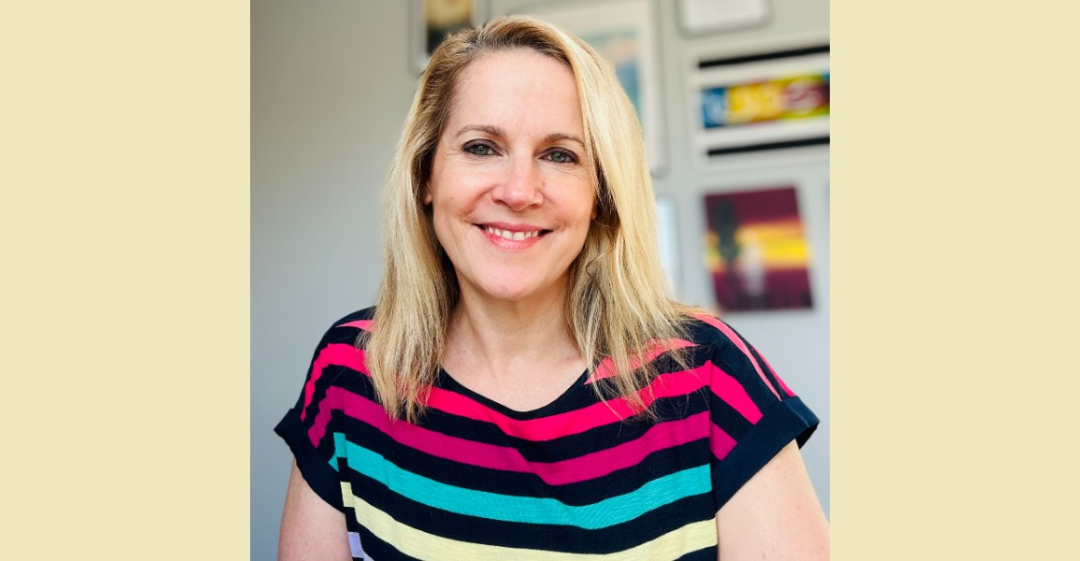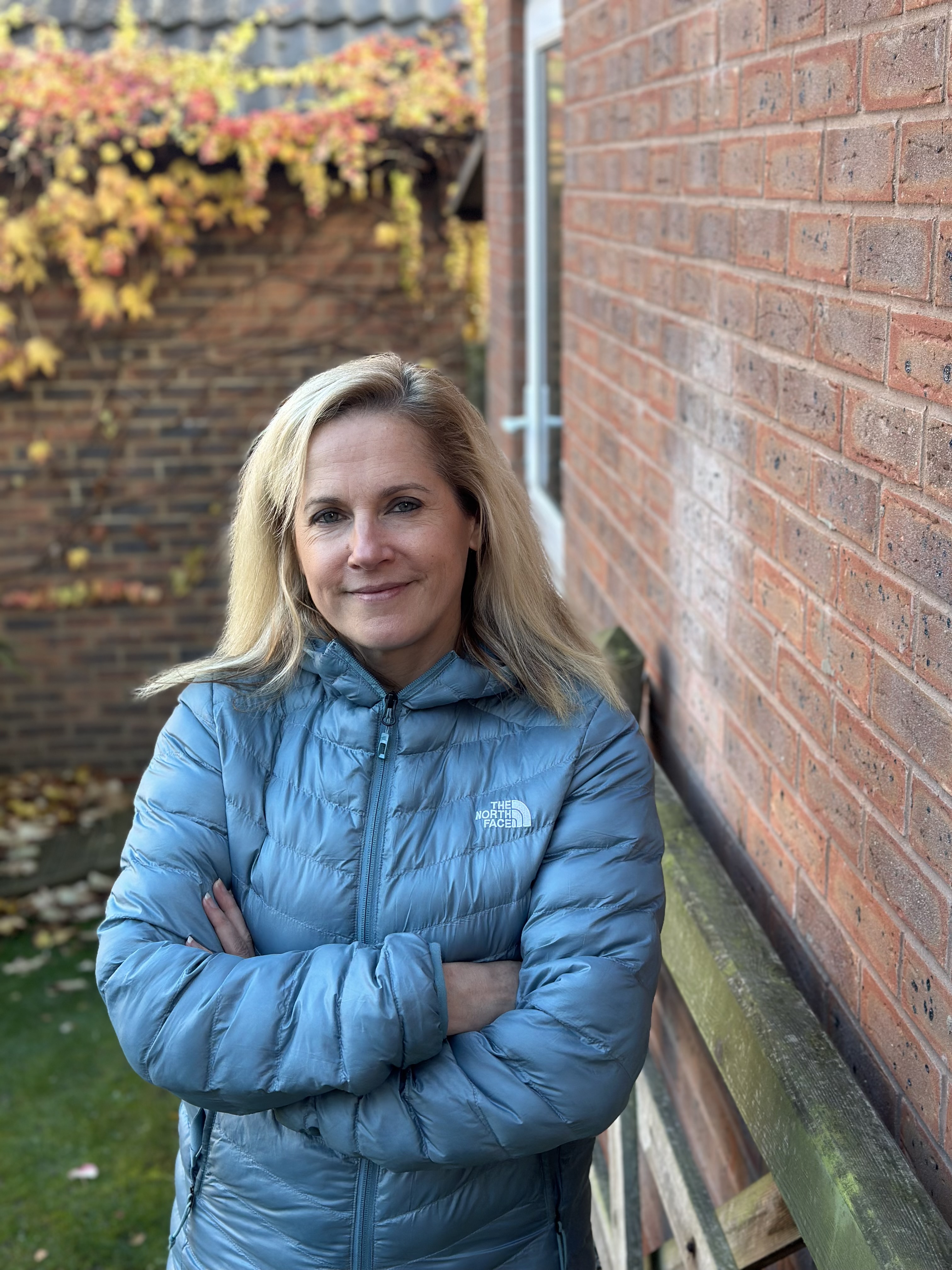“I was utterly miserable in my job. Everything was about profits, not people, and I was being inauthentic every day.”

What work were you doing previously?
I was the Financial Controller of a small telecoms company for 10 years.
What are you doing now?
I'm now the Finance Director of a charity called the Thalidomide Trust.
In 2023, after 4 years of training, I qualified as a counsellor, and reduced my hours at the charity so I could work half a day each week in my private practice.
Since January 2025, I'm now doing this for one full day per week.
Why did you change?
I was utterly miserable in my job in telecoms.
The people were lovely, and there were parts of the job I enjoyed, however there was no investment in employee wellbeing.
Literally everything was about maximising profits. The message from the top of the organisation was to make staff work harder, to be hard on them, with the assumption everyone was lazy.
But the fact is, they were lovely people who wanted to do a good job. We were always under-resourced, and there were no pay increases for 4 years, not even inflationary increases.
Trying to motivate people in those conditions was extremely stressful, and I continuously felt I was letting people down.
Every day I wore a mask to try to be that hard emotionless manager that I was told I should be. I thought I hated the job itself, but later I would realise it was the values of the company that didn’t match my own.
I was being inauthentic every day, trying to play the role of someone that the company wanted me to be.
When was the moment you decided to make the change?
I was a single mum to my amazing daughter, who is now 25.
I started at the company in 2009 when she was 9. I had worked incredibly hard to qualify as an accountant from 2003 to 2009, motivated by a desire to provide financially for my daughter.
I desperately didn’t want her to feel she was missing out in any way by having divorced parents.
Due to being completely depressed and anxious in my job, and working 60+ hours each week, I joined the Careershifters Career Change Launch Pad in Feb 2015.
It was brilliant and I learned so much of value but the one obstacle I couldn’t get past was that I had no one to support me in paying the bills.
This was the biggest issue for me. I felt that any career change I made would require me to go back to an entry-level job and a huge drop in pay.
I had no savings to fall back on. No matter how sad and desperate I was, I couldn’t see a way around this. I felt absolutely trapped.
However, as time passed, I never forgot the things I’d learned on the course, one of which was to try things out that interested you – ‘act it out, don’t think it out’.
I'd always had an interest in Psychology. My school didn’t offer Psychology GCSEs when I was there, and I thought the only way to work in this area was to spend years and a fortune getting a degree.
I couldn’t afford either the time or the expense. However, in April 2018, I came across an Introduction to Counselling course at an adult learning centre close to my work; it was only £100 for 10 weeks so I decided to try it out.
I absolutely loved it, and discovered that I could become a counsellor via a different training pathway. It would still take several years but would be a lot less money than a degree and I could do it at evening classes.
I started my Level 2 training in September 2018, with the intention to change careers completely once I qualified.
I believe that it was through the early few months of my counselling training that I started to become aware of some of my own self-limiting beliefs, and what was actually possible.
A friend of mine worked for an amazing charity (the Thalidomide Trust) where, not only did they have an overarching goal of maximising the quality of lives of their beneficiaries, but they had a genuine wish to create a positive environment for their employees.
One day she said the role of Finance Director had come up. My initial reaction was ‘I’ve never worked in a charity before, and it will be such a big step up for me, I won’t be able to do it’. But somewhere inside me, something had shifted.
I felt ready to push myself outside my comfort zone, and I decided to give it a try, with a ‘nothing ventured, nothing gained’ mindset.
Are you happy with the change?
It's no understatement to say that my life has transformed.
Before, I was permanently stressed and depressed, completely miserable and barely hanging on. Now I'm happy and motivated in my job.
I work with a fantastic bunch of people. Everyone genuinely cares and works hard to make a difference in the lives of our beneficiaries.
As a member of the Senior Management Team, we believe that employee wellbeing translates directly into increased motivation and productivity.
It's hugely positive for our beneficiaries and we actively seek to ensure that employees are heard, respected and feel valued. In the end, I didn't have to take a pay cut to make this change.
And, as a self-employed counsellor with my own private practice (just one day per week for now, but hopefully in time two), I've fulfilled a lifelong ambition that I honestly never thought I'd ever achieve.
I'm fascinated by the theory and practice of psychotherapy, by understanding how we are all shaped by events in our lives and how we form unconscious beliefs.
I'm also fascinated by how we tell ourselves stories that can both help and hinder us, and how, with help, we can work on ourselves to transform our own lives.
How we can unleash the potential that we all have within ourselves to live authentically and in ways we may never have thought possible. I'm living proof of this!
I'm incredibly proud of what I've achieved and I thoroughly enjoy this new part of my life.
What do you miss and what don't you miss?
There's nothing I miss from my old life pre-charity.
In particular, I don't miss the mindset of profits above all else, and at the expense of the people who actually make things happen.
I realise that I'm not motivated by money in the way other people might chase a bonus.
While I want to be fairly compensated for the work I do, I'm motivated by making a difference to people’s lives, and by being part of a team that I respect and in which I feel respected.
How did you go about making the shift?
I applied and was one of two candidates who got to final interview.
I didn’t get it; the other candidate was much more experienced in the charity sector and was considered a safer pair of hands.
I was gutted, but undeterred, and I wrote a letter to the Director of the charity, thanking them for their time and expressing my continued interest if something should come along in future.
I applied for another similar role and the same thing happened: final two candidates and the more experienced candidate got the job. Whilst I wasn’t wavering, these types of jobs were not ten-a-penny, and a few months passed without any opportunities coming along.
And then, in early December, I got a phone call from the Director of the Thalidomide Trust. The person who'd been offered the job had tendered their resignation after just 6 months (they decided it wasn’t for them) – and if I was still interested, they would like to offer it to me.
I jumped at the chance. My existing employer tried to persuade me to stay, offering me an eye-watering pay increase and bonus, which actually just made me realise how much they had been under-paying me up until then!
It wasn’t about the money anyway. I needed to do something that aligned with my values and my authentic self.
So in my role as FD of the charity, I no longer feel the need to switch careers. I get a lot of positives from both roles. Working as part of a team at the charity, the social interaction and sense of belonging to a great organisation.
Counselling is fulfilling and rewarding but also quite solitary, so the two roles complement each other really well.
How did you develop (or transfer) the skills you needed for your new role?
I had a lot of transferable skills from being a senior manager in the private sector.
The main gap was learning how finances differed in the charity sector. Using one of the techniques I learned during my Careershifters Launch Pad course, I reached out to someone my friend knew.
He was a partner at a local auditors who did a lot of work for charities. I asked if he'd be willing to share some advice on the best way for me to make the transition between business accounts and charity accounts.
He was happy to have a coffee and in the end, he spent well over an hour with me explaining the key technical differences. He also gave me some pointers on how I could go away and build my knowledge further.
This was so valuable, and I'm not sure I would've dared reach out like this without having done the Careershifters course.
In terms of my role as a self-employed counsellor, the tutor on my Introductory course was very helpful. I reached out to a local counsellor to ask them about potential training centres near me.
It was a completely new area for me and I worked really hard in the evenings and at weekends for over four years to qualify. However, the investment paid off.
What didn’t go well? What wrong turns did you take?
I don’t think I took any wrong turns once I was on my way.
An earlier version of me might have been put off at being rejected not once, but twice. However, I think I would've carried on even if that wasn’t the case.
How did you handle your finances to make your shift possible?
I knew I could live on less money than I was on, in order to make the change from Financial Controller to full-time counsellor.
This was my original intention in 2018 when I started my training.
It would require a bit of careful budgeting, but I felt that the change would be minimal and it wouldn’t mean I was ‘failing’ my daughter. In the end, this wasn’t an issue, as my role at the charity meant I didn’t need to reduce my pay at all.
What was the most difficult thing about changing?
Overcoming my self-limiting beliefs about what I was capable of.
I have some notes from one of the exercises I did on the Careershifters course called ‘Fictional filters’ in which I'd listed:
. I have to carry on working in finance or I'll ruin my CV
. I'm not confident
. I'm not good with people
. I can’t do loads of things
None of the above are true!
Being able to see beyond my belief that a change in career meant living on a pittance.
Finding the time and headspace, when my mental health wasn't good and I was working such long hours, to do something ‘extracurricular’ in my pursuit of something I enjoyed.
What help did you get?
I had some supportive friends and family spurring me on.
What have you learnt in the process?
I've learned that so often we tell ourselves stories about ourselves that keep us trapped.
We are capable of infinitely more than we think.
What do you wish you'd done differently?
I wish I'd not waited so long.
What would you advise others to do in the same situation?
Not to give up.
It took me a while to find my way. Sometimes it takes looking at things slightly differently. I thought I hated Finance and that the only solution was to change careers.
This turned out to be untrue. It was the values of the organisation I didn’t like. I actually love Finance now that I'm working in an organisation whose values align with my own and in which I can be completely authentic.
What resources would you recommend to others?
I believe that counselling (or in some cases, coaching) can help us to become aware of, challenge and overcome subconscious self-limiting beliefs that keep us trapped.
As part of my counselling training journey, I had a lot of personal therapy and have let go of a lot of my past that was no longer serving me.
Suzanne took part in our Career Change Launch Pad. If you're ready to join a group of bright, motivated career changers on a structured programme to help you find more fulfilling work, you can find out more here.
What lessons could you take from Suzanne's story to use in your own career change? Let us know in the comments below.



